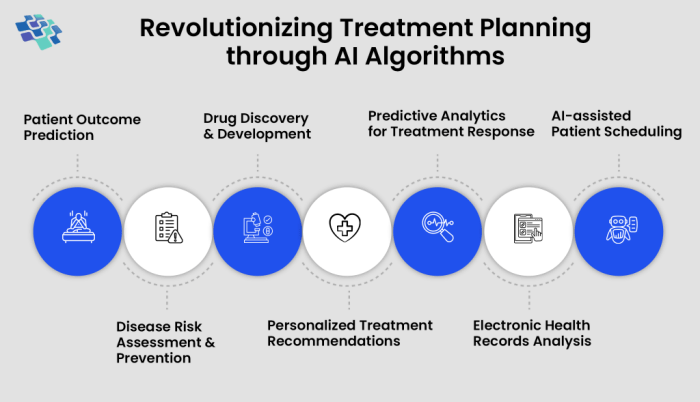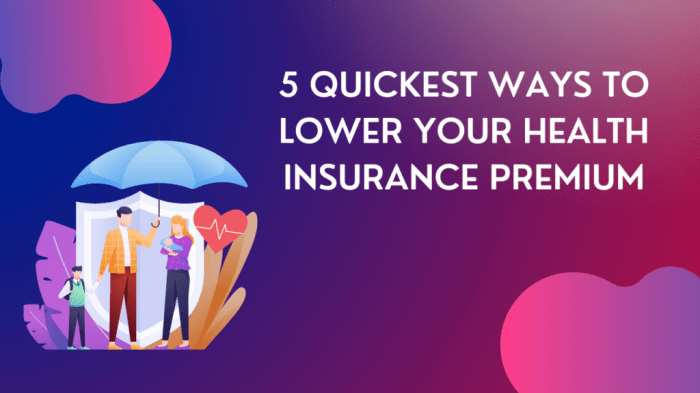The Future of Personalized Health Plans and Smart Insurance
Exploring the advancements in Personalized Health Plans and Smart Insurance opens up a world of possibilities where healthcare meets cutting-edge technology. As we delve into this topic, we uncover how tailor-made health plans and intelligent insurance solutions are reshaping the landscape of healthcare, offering personalized experiences and improved outcomes for individuals.
From the integration of smart technology to the revolutionizing impact on the healthcare industry, this discussion will shed light on the transformative journey towards a more individualized and efficient healthcare system.
Overview of Personalized Health Plans and Smart Insurance
Personalized health plans and smart insurance are innovative approaches in the healthcare and insurance industries that aim to provide tailored solutions for individuals based on their specific needs and health data.
Definition of Personalized Health Plans and Smart Insurance
Personalized health plans are customized healthcare strategies designed to meet the unique requirements of each individual. They take into account personal health history, lifestyle choices, genetic predispositions, and other factors to offer personalized treatment and preventive care. On the other hand, smart insurance utilizes technology such as wearables, mobile apps, and data analytics to provide real-time insights and personalized coverage options to policyholders.
Differences from Traditional Health Insurance
Unlike traditional health insurance plans that offer standardized coverage for all policyholders, personalized health plans focus on individualized care and preventive measures. Smart insurance goes a step further by leveraging technology to monitor health metrics, provide timely interventions, and incentivize healthy behaviors, ultimately reducing healthcare costs and improving outcomes.
Benefits of Integrating Smart Technology into Insurance Plans
- Real-time monitoring of health metrics allows for early detection of health issues and timely interventions.
- Personalized recommendations based on individual health data lead to more targeted and effective treatments.
- Incentives for healthy behaviors promote proactive healthcare management and preventive measures.
- Data analytics help insurance providers optimize coverage options and pricing, ensuring cost-effective and efficient healthcare delivery.
Revolutionizing the Healthcare Industry
Personalized health plans and smart insurance are transforming the healthcare industry by shifting the focus from reactive care to proactive and preventive measures. By harnessing the power of data and technology, these innovative approaches are improving health outcomes, reducing healthcare costs, and empowering individuals to take control of their health and well-being.
Importance of Personalized Health Plans
Personalized health plans play a crucial role in revolutionizing the healthcare industry by tailoring medical interventions to individual needs. These plans are designed to provide targeted care and support based on a person's unique health profile, ultimately leading to better health outcomes and cost savings.
Role of Personalized Health Plans in Preventative Care
Personalized health plans focus on proactive measures to prevent illnesses rather than just treating symptoms. By analyzing an individual's genetic predispositions, lifestyle habits, and medical history, these plans can identify potential health risks early on and implement preventive strategies to mitigate them.
This approach not only improves the quality of life for individuals but also reduces the burden on the healthcare system by lowering the incidence of chronic diseases.
Improving Health Outcomes with Personalized Health Plans
Through personalized health plans, healthcare providers can offer targeted treatments and interventions that are specifically tailored to each patient's needs. By considering factors such as genetic makeup, environmental influences, and lifestyle choices, these plans can optimize treatment effectiveness and enhance health outcomes.
This personalized approach leads to better patient satisfaction, increased adherence to treatment regimens, and ultimately improved overall health for individuals.
Impact on Reducing Healthcare Costs
Personalized health plans have the potential to significantly reduce healthcare costs by preventing costly medical interventions through early detection and intervention. By focusing on preventive care and individualized treatment strategies, these plans can help avoid unnecessary hospitalizations, emergency room visits, and costly procedures.
Additionally, by promoting healthy lifestyle choices and disease prevention, personalized health plans can lower long-term healthcare expenses and contribute to overall cost savings for individuals and healthcare systems.
Promoting Individualized Healthcare Experiences
Personalized health plans offer a unique and tailored approach to healthcare that prioritizes individual needs and preferences. By involving patients in the decision-making process and considering their personal goals and values, these plans create a more personalized and engaging healthcare experience.
This patient-centered approach fosters trust, communication, and collaboration between healthcare providers and patients, leading to better treatment outcomes and overall satisfaction with the healthcare experience.
Technologies Shaping the Future of Personalized Health Plans and Smart Insurance

In today's rapidly evolving healthcare landscape, technological advancements play a crucial role in shaping the future of personalized health plans and smart insurance. These innovative technologies are revolutionizing the way healthcare is delivered, making it more tailored to individual needs and promoting proactive health management.Artificial intelligence (AI) is at the forefront of driving advancements in personalized health plans.
By leveraging AI algorithms, healthcare providers can analyze vast amounts of data to identify patterns and trends, allowing them to create customized health plans for each individual. AI helps in predicting health risks, recommending preventive measures, and optimizing treatment plans based on a person's unique health profile.Wearable devices and health trackers are also integral to smart insurance programs.
These devices collect real-time data on an individual's health metrics, such as heart rate, sleep patterns, and exercise levels. This data is then used by insurers to incentivize healthy behaviors and offer personalized insurance plans that align with a person's lifestyle and health goals.Telemedicine and remote monitoring have become indispensable tools in personalized health management.
Telemedicine enables individuals to consult with healthcare providers remotely, eliminating the need for in-person visits and improving access to care. Remote monitoring devices, such as blood pressure cuffs and glucose monitors, allow healthcare providers to track a person's health status continuously and intervene proactively when needed.Overall, these technologies are driving a paradigm shift in healthcare towards a more personalized, proactive, and preventive approach.
By harnessing the power of AI, wearable devices, telemedicine, and remote monitoring, personalized health plans and smart insurance programs are paving the way for a healthier and more connected future.
Data Privacy and Security in Personalized Health Plans

Personalized health plans involve the collection and analysis of sensitive health data, making data privacy and security crucial aspects of these systems. It is essential to address concerns regarding the protection of personal health data to ensure the trust and confidentiality of individuals participating in such plans.
Importance of Data Encryption and Secure Storage
In personalized health plans and smart insurance systems, data encryption and secure storage play a vital role in safeguarding sensitive information. By encrypting data, it becomes unreadable to unauthorized users, reducing the risk of data breaches and ensuring confidentiality. Secure storage methods, such as cloud storage with robust security measures, help prevent unauthorized access to personal health information.
Regulations and Compliance Standards
There are regulations and compliance standards in place to safeguard health information in personalized plans, such as the Health Insurance Portability and Accountability Act (HIPAA) in the United States. These regulations Artikel the requirements for protecting the privacy and security of individuals' health information, including data encryption, secure storage, and access controls.
Compliance with these standards is essential to ensure the legal and ethical handling of personal health data.
Best Practices for Data Privacy and Security
- Implementing access controls to restrict data access to authorized personnel only.
- Conducting regular security assessments and audits to identify and address potential vulnerabilities.
- Providing employee training on data privacy and security practices to ensure awareness and compliance.
- Utilizing encryption protocols for data transmission and storage to protect sensitive information.
- Establishing incident response plans to address data breaches promptly and mitigate potential risks.
Final Wrap-Up
In conclusion, the future of Personalized Health Plans and Smart Insurance holds promise for a healthcare system that is not only more efficient but also more tailored to individual needs. With advancements in technology and a focus on personalized care, the road ahead looks bright for a healthcare experience that is truly smart and personalized.
Frequently Asked Questions
How do personalized health plans differ from traditional health insurance?
Personalized health plans focus on tailoring healthcare services to individual needs and preferences, while traditional health insurance offers more standardized coverage.
What are some key technologies driving advancements in personalized health plans?
Key technologies include artificial intelligence, wearable devices, health trackers, telemedicine, and remote monitoring.
How do personalized health plans promote individualized healthcare experiences?
By customizing healthcare services, focusing on preventative care, and leveraging smart technology to monitor health data in real-time, personalized health plans offer a more tailored and engaging healthcare experience.



